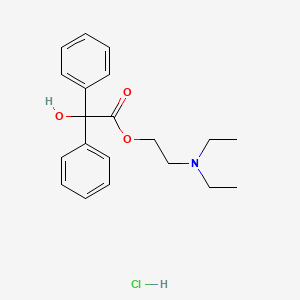



1. Amizil
2. Amizyl
3. Benactyzine
4. Lucidil
1. 57-37-4
2. Neuroleptone
3. Tranquilline
4. Amitakon
5. Nutinal
6. Parasan
7. Suavitil
8. Cedad
9. Benaktin
10. Destendo
11. Ibiotyzil
12. Leucidil
13. Nervacton
14. Nervatil
15. Neuraktil
16. Neurobenzil
17. Valladan
18. Valladon
19. Aktozin
20. Amisil
21. Amisyl
22. Amizil
23. Amysyl
24. Amyzyl
25. Arkadin
26. Cafron
27. Cevanol
28. Katron
29. Lucidil
30. Parazan
31. Parpon
32. Phobex
33. Procalm
34. Prokalm
35. Stoikon
36. Fobex
37. 2-(diethylamino)ethyl 2-hydroxy-2,2-diphenylacetate Hydrochloride
38. Amizil Hydrochloride
39. Amizyl Hydrochloride
40. Benactyzine Chloride
41. Benactyzine Hcl
42. Benactizine Hydrochloride
43. Benactyzin
44. Win 5606
45. 2-diethylaminoethyl Benzilate Hydrochloride
46. Ay 5406-1
47. 2-diethylaminoethyl Diphenylglycolate Hydrochloride
48. 57-37-4 (hcl)
49. Mls000069801
50. Benzilate Du Diethylamino-ethanol Chlorhydrate
51. Diphenylglycollic Acid 2-(diethylamino)ethyl Ester Hydrochloride
52. Nsc-16339
53. 2-(difenyl-hydroxyacetoxy)ethyl-diethylammoniumchlorid
54. Morcain
55. Smr000059142
56. 26r628272q
57. .beta.-diethylaminoethyl Benzilate Hydrochloride
58. Benactyzin [czech]
59. 2-(diethylamino)ethyl 2-hydroxy-2,2-diphenylacetate;hydrochloride
60. Einecs 200-324-4
61. Nsc 16339
62. Ea 2092
63. Amioyl
64. Ai3-26379
65. Beta-diethylaminoethyl Benzilate Hydrochloride
66. Unii-26r628272q
67. Ethanol, 2-(diethylamino)-, Benzilate Hydrochloride
68. Benzilate Du Diethylamino-ethanol Chlorhydrate [french]
69. Ay-5406
70. Benzilic Acid Beta-diethylaminoethyl Ester Hydrochloride
71. Alpha-hydroxy-alpha-phenylbenzeneacetic Acid 2-(diethylamino)ethyl Ester
72. Opera_id_144
73. 2-(difenyl-hydroxyacetoxy)ethyl-diethylammoniumchlorid [czech]
74. 2-diethylaminoethylester Kyseliny Benzilove Hydrochlorid [czech]
75. Benzeneacetic Acid, Alpha-hydroxy-alpha-phenyl-, 2-(diethylamino)ethyl Ester, Hydrochloride
76. Mls001148661
77. Mls001424153
78. Schembl4419579
79. Ethanol, Benzilate Hydrochloride
80. 2-diethylaminoethylester Kyseliny Benzilove Hydrochlorid
81. Chembl1584883
82. Dtxsid8052774
83. Hy-b1542a
84. Benzilic Acid, 2-(diethylamino)ethyl Ester, Hydrochloride
85. 2-diethylaminoethyl 2-hydroxy-2,2-diphenylacetate Hydrochloride
86. Nsc16339
87. Mfcd00012624
88. S3701
89. Wln: Qxr&r&vo2n2&2 &gh
90. Benactyzine Hydrochloride [mi]
91. Akos015901413
92. Ccg-101069
93. Cs-8073
94. Nc00319
95. Benactyzine Hydrochloride [mart.]
96. Benactyzine Hydrochloride [vandf]
97. Ac-32563
98. Benactyzine Hydrochloride [who-dd]
99. Benzeneacetic Acid, .alpha.-hydroxy-.alpha.-phenyl-, 2-(diethylamino)ethyl Ester, Hydrochloride
100. Ds-11395
101. Benactyzine Hydrochloride, >=98% (hplc)
102. Ay-5406-1
103. Db-053044
104. 2-(diethylamino)ethyl Benzilate Hydrochloride
105. B0053
106. Ft-0612170
107. D88595
108. Q27254124
109. Benzilic Acid 2-(diethylamino)ethyl Ester Hydrochloride
110. Benzilic Acid, 2-(diethylamino)ethyl Ester Hydrochloride
111. Benzilic Acid .beta.-diethylaminoethyl Ester Hydrochloride
112. Benzeneacetic Acid, .alpha.-hydroxy-.alpha.-phenyl-, 2-(diethylamino)ethyl Ester, Hydrochloride (1:1)
113. Benzeneacetic Acid, Alpha-hydroxy-alpha-phenyl-, 2-(diethylamino)ethyl Ester, Hydrochloride (1:1)
| Molecular Weight | 363.9 g/mol |
|---|---|
| Molecular Formula | C20H26ClNO3 |
| Hydrogen Bond Donor Count | 2 |
| Hydrogen Bond Acceptor Count | 4 |
| Rotatable Bond Count | 9 |
| Exact Mass | 363.1601214 g/mol |
| Monoisotopic Mass | 363.1601214 g/mol |
| Topological Polar Surface Area | 49.8 Ų |
| Heavy Atom Count | 25 |
| Formal Charge | 0 |
| Complexity | 351 |
| Isotope Atom Count | 0 |
| Defined Atom Stereocenter Count | 0 |
| Undefined Atom Stereocenter Count | 0 |
| Defined Bond Stereocenter Count | 0 |
| Undefined Bond Stereocenter Count | 0 |
| Covalently Bonded Unit Count | 2 |
Antidepressive Agents
Mood-stimulating drugs used primarily in the treatment of affective disorders and related conditions. Several MONOAMINE OXIDASE INHIBITORS are useful as antidepressants apparently as a long-term consequence of their modulation of catecholamine levels. The tricyclic compounds useful as antidepressive agents (ANTIDEPRESSIVE AGENTS, TRICYCLIC) also appear to act through brain catecholamine systems. A third group (ANTIDEPRESSIVE AGENTS, SECOND-GENERATION) is a diverse group of drugs including some that act specifically on serotonergic systems. (See all compounds classified as Antidepressive Agents.)
Muscarinic Antagonists
Drugs that bind to but do not activate MUSCARINIC RECEPTORS, thereby blocking the actions of endogenous ACETYLCHOLINE or exogenous agonists. Muscarinic antagonists have widespread effects including actions on the iris and ciliary muscle of the eye, the heart and blood vessels, secretions of the respiratory tract, GI system, and salivary glands, GI motility, urinary bladder tone, and the central nervous system. (See all compounds classified as Muscarinic Antagonists.)
Parasympatholytics
Agents that inhibit the actions of the parasympathetic nervous system. The major group of drugs used therapeutically for this purpose is the MUSCARINIC ANTAGONISTS. (See all compounds classified as Parasympatholytics.)